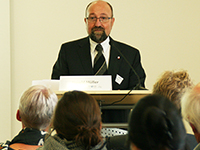For almost 20 years, Prof. Dr Harald Müller served as Executive Director of PRIF and head of the research department “International Security and World Order”. On the occasion of his retirement, PRIF held an international conference from October 13-14 2016, which was co-sponsored by the German Foundation for Peace Research (DSF).
The conference looked at the major themes of peace research of the past decades, and discussed their relevance for contemporary world politics. Which issues could and should be addressed, which insights are still valid, which open questions have been answered? Central aspects were the design of institutions and their opportunities for cooperation, democratic peace, and aspects of global justice.
The first panel Norms, Institutions and Cooperation focused on the rise and fall of political orders. What are the consequences of norm erosion: spaces free of any norms, or new norms that replace the old ones? When is either one process taking place? Are norm-free spaces even possible? These are open questions to be addressed by future research. Another issue of debate was the design of future regimes and their flexibility.
The second panel Democratic Peace and Democratic Wars acknowledged that democratic peace issues have not been at the center of debates in recent years, and wrongfully so. As politics of democratic peace and war are still central to liberal internationalism, there would still be uge demand for fresh research on the topic. New perspectives were identified in the combination of research areas that had not been cooperating earlier, like the interaction of specific foreign policy norms and the institutional design of parliamentary control.
The third panel Arms control in Crisis? The example of the NPT agreed that the high hopes for arms control after the end of the cold war have worn of, and that arms control itself is more than ever at risk today. It is the duty of peace research to carve out possibilities for comprehensive arms control. The panel emphasized the special role of democracy in the adherence of international agreements on arms control and disarmament.
Panel 4 Justice, Peace, and Governance focused on PRIF’s current research program that analyzes justice-related conflicts and the ways in which peace and justice can be achieved at the same time. The panel agreed that striving for justice is essential for handling conflicts and the design of world order. With a view to current developments of global significance, the panelists emphasized the complex relationship between justice and order and the danger of undermining cooperative institutions due to the perception of injustice. Promising conflict resolutions can be seen in places where demands for justice are taken seriously.
World Order and Peace – the conference program (pdf)
Grußworte:
- Prof. Dr. Nicole Deitelhoff, Director of Peace Research Institute Frankfurt (PRIF)
- Dr. Beatrix Tappeser, Hessen State Ministry
- Prof. Dr. Tanja Brühl, Vice President at Goethe University Frankfurt
- Dr. Thomas Held, German Foundation for Peace Research
- Prof. Dr. Sebastian Lentz, Director of the Leibniz Institute for Regional Geography, Leibniz Association
- Dr. Patricia Flor, Federal Government Commissioner for Disarmament and Arms Control, Federal Foreign Office
Keynote speech:
- Prof. Dr. Thomas Risse, Professor of International Relations and Director of the Center for Transnational Relations, Foreign and Security Policy at the Otto Suhr Institute of Political Science at the Freie Universität Berlin
